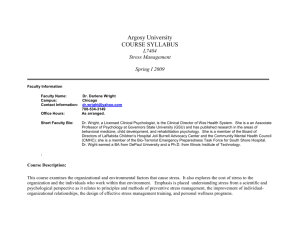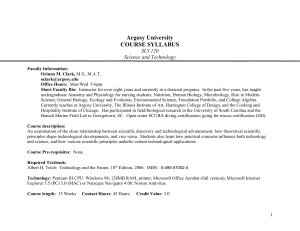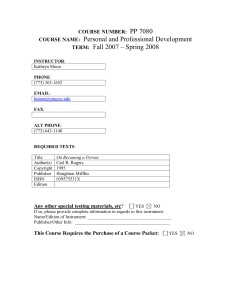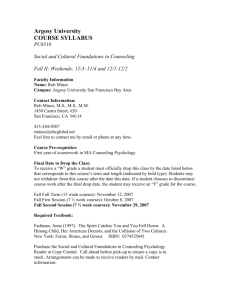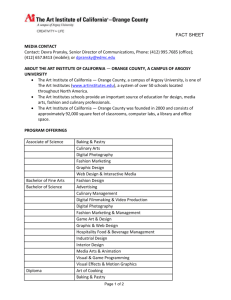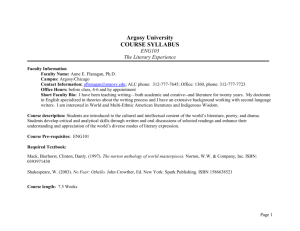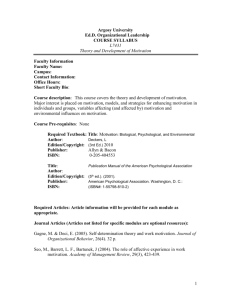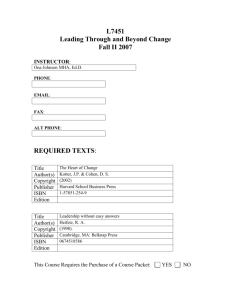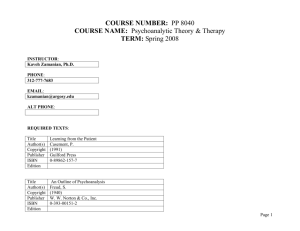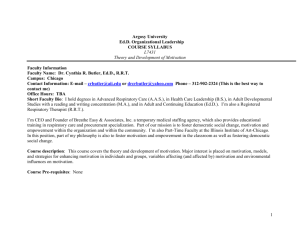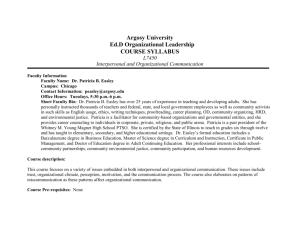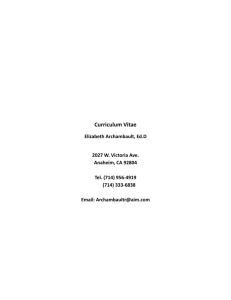Child and Adolescent Development - Argosy University Dissertation
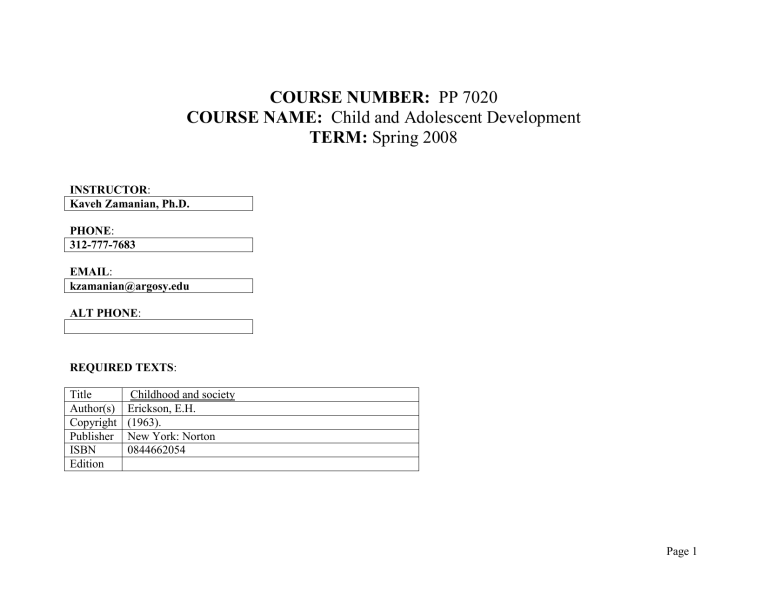
COURSE NUMBER: PP 7020
COURSE NAME: Child and Adolescent Development
TERM: Spring 2008
INSTRUCTOR :
Kaveh Zamanian, Ph.D.
PHONE :
312-777-7683
EMAIL : kzamanian@argosy.edu
ALT PHONE :
REQUIRED TEXTS :
Title Childhood and society
Author(s) Erickson, E.H.
Copyright (1963).
Publisher New York: Norton
ISBN 0844662054
Edition
Page 1
Title The Harvard Lectures
Author(s) Freud, A.
Copyright (1992).
Publisher International Universities Press, Inc.
ISBN
Edition
ISBN10:0823623106 ISBN-13:978-0823623105
Title The Developing Brain
Author(s) Siegal, D.J.
Copyright (1999)
Publisher The Guilford Press
ISBN ISBN10-1572307404 ISBN-13:978-1572307407
Edition
This Course Requires the Purchase of a Course Packet:
YES NO
Page 2
Argosy University
COURSE SYLLABUS
Child and Adolescent Development
PP 7020
Faculty Information
Faculty Name:
Campus:
Contact Information:
Office Hours:
Short Faculty Bio:
Kaveh Zamanian, Ph.D.
Chicago
312-777-7683
Mondays 8-12
Course description and Objective:
The general purpose of this course is to facilitate an understanding of the relationship between physical maturation, emotional development and healthy adaptation or psychopathology as manifested in both childhood and adulthood. The specific goals of the course are to help students:
Become familiar with the central issues and primary theoretical perspectives of child development
Consider how cognitive, social-cultural and emotional aspects of development influence psychological functioning
Begin developing a frame of reference for observing and evaluating healthy and maladaptive functioning
Establish an organizational framework to conceptualize clinical material as it is integrated with developmental research and theory
Write well-organized, conceptually integrated behavioral observations and clinical assessments that present a clear understanding of children’s psychological development
Consider the relationship between theories of child development and clinical practice and begin to apply that knowledge to case conceptualization and application
Page 3
By the end of the semester you will be able to conceptualize and integrate a broad range of theoretical and developmental considerations to produce an informed psychological assessment of a child/adolescent with respect to his/her overall adjustment, adaptations, developmental strengths and limitations.
Course Pre-requisites: None
Required Textbook:
Course Packet and the following books:
Course Packet
Erickson, E.H. (1963). Childhood and society. New York: Norton. ISBN# 0844662054
Freud, A. (1992). The Harvard Lectures.
International Universities Press, Inc. ISBN10:0823623106 ISBN-13:978-0823623105
Siegal, D.J. (1999). The Developing Brain . The Guilford Press. ISBN10-1572307404 ISBN-13:978-1572307407
Course length: 15 Weeks
Credit Value : 3.0
Program Outcomes: The Doctoral program in Clinical Psychology at Argosy University Chicago Campus is an APA accredited program (APA, 750 First St. NE, Washington, DC 20002, 202-336-5500). This program is designed to educate and train students so that they may eventually be able to function effectively as clinical psychologists. To ensure that students are prepared adequately, the curriculum provides for the meaningful integration of theory, training and practice. The Clinical Psychology program at Argosy
University Chicago Campus emphasizes the development of attitudes, knowledge, and skills essential in the formation of professional psychologists who are committed to the ethical provision of quality services. Specific objectives of the program include the following:
Page 4
Goal 1: Prepare professional psychologists to accurately, effectively, and ethically select, administer, score, interpret, and communicate findings of appropriate assessment methods informed by accepted psychometric standards and sensitive to the diverse characteristics and needs of clients. o Objective 1a: Accurately and ethically administer and score various psychodiagnostic instruments. o Objective 1b: Accurately interpret and synthesize assessment data in the context of diversity factors, referral questions, and specific objectives of the assessment, and organize and communicate results in writing and orally. o Objective 1c: Examine psychometric properties of psychological assessment instruments, and use that knowledge to evaluate, select, administer, and interpret psychological tests and measures appropriate for the client, the referral question, and the objectives of the assessment.
Goal 2: Prepare professional psychologists to select, implement, and evaluate psychological interventions consistent with current ethical, evidence-based, and professional standards, within a theoretical framework, and with sensitivity to the interpersonal processes of the therapeutic relationship and the diverse characteristics and needs of clients. o Objective 2a: Synthesize the foundations of clinical psychology, including psychopathology, human development, diagnosis, diversity, ethics, and various therapeutic models in clinical applications. o Objective 2b: Select, plan, and implement ethical and evidence-based interventions with sensitivity to the diverse characteristics and needs of clients. o Objective 2c: Demonstrate knowledge, skills, and attitudes to effectively implement and participate in psychological consultation and supervision.
Objective 2d: Demonstrate personal development and self-reflective capacity, including growth of interpersonal skills, and therapeutic relationships.
Goal 3: Prepare professional psychologists to analyze the complexity and multidimensionality of human diversity, and demonstrate the knowledge, skills, and attitudes necessary to understand diverse worldviews and the potential meaning of social, cultural, and individual differences for professional psychological services.
Goal 4: Prepare professional psychologists to examine the historical context and the current body of knowledge of biological, cognitive, affective, developmental, and social bases of human functioning.
Goal 5: Prepare professional psychologists to critically evaluate the current and evolving body of scholarly literature in psychology to inform professional practice.
Page 5
Assignment Table
Class Assignments:
Please arrive to the first class meeting having read the following articles and be prepared to discuss:
Rogoff, B. (2003). Orienting concepts and ways of understanding the cultural nature of human development. In The cultural nature of human development (Chapter 1). New York: Oxford University Press. (Course Packet)
Shonkoff, J.P., & Phillips, D.A. (2000). From neurons to neighborhoods: The science of early child development (Chapter 1 & 2)
Washington, D.C.: National Academy Press. (Required Text: Online Library)
Abstracts/Summary of Reading Assignments (10 Points):
Students will be assigned various articles and/or book chapters to abstract or summarize ( no longer than a page per article/chapter ).
Abstract/summaries will have the citation at the top of the page and include the date of presentation and student’s name.
Abstract/summaries will be an overview of the major themes and points of the article. Students will be expected to present the abstracts to the class and lead a discussion of the assigned reading. Each student should expect to summarize and present at least twice over the course of the semester.
Mid-term (40 Points) & Final Exams (40 points)
Take home mid-term and final exam will be assigned and distributed that will assess your understanding and command of the material on conceptual, theoretical and practical levels. The exam will consist of 5-6 essay questions related to the topics covered during the semester.
Please be advised that both Midterm and Final Paper will be due at the beginning of the class date specified. It is important that papers be submitted in a timely manner and therefore no late papers will be accepted ( no exceptions allowed ). Be sure to save and print your papers as to avoid computer failures and loss of an entire paper. Be advised that computer and other technical problems will not be considered as a legitimate excuse for missing the submission deadline. All papers are to be written in APA format including cover page and appropriate citations and references.
Page 6
Grading Criteria
Grading requirements
A
A-
B+
B
B-
C+
C
C-
D+
D
D-
F
100 – 93
92 – 90
89 – 88
87 – 83
82 – 80
79 – 78
77 - 73
72 – 70
69 – 68
67 – 63
62 – 60
59 and below
Grading Scale
Attendance/participation
Reading Assignments
Midterm
Final
10%
10%
40%
40%
100%
Library Resources
Argosy University’s core online collection features more than
21,000 full-text journals, 23,000 electronic books and other content covering all academic subject areas including Business & Economics, Career & General Education, Computers, Engineering &
Applied Science, Humanities, Science, Medicine & Allied Health, and Social & Behavior Sciences. All electronic resources can be accessed through the library’s website at www.auchicagolib.org
. User IDs and passwords are distributed during orientation, but can also be obtained at the circulation desk, calling 312-777-7653, or by e-mail at auchilibrary@argosy.edu
.
In addition to online resources, Argosy University’s onsite collections contain a wealth of subject-specific research materials searchable in the Library Online Catalog. Catalog searching is easily limited to individual campus collections. Alternatively, students
Page 7
can search combined collections of all Argosy University Libraries. Students are encouraged to seek research and reference assistance from campus librarians.
Information Literacy: Argosy University’s Information Literacy Tutorial was developed to teach fundamental and transferable research skills, including selecting sources appropriate for academic-level research, searching periodical indexes and search engines, and evaluating and citing information. In the tutorial, students study concepts and practice them through interactions. At the conclusion of each module, they can test their comprehension and receive immediate feedback. Each module takes less than 20 minutes to complete. Please view the tutorial at http://library.argosy.edu/infolit/
Academic Policies
Academic Dishonesty/Plagiarism: In an effort to foster a spirit of honesty and integrity during the learning process, Argosy University requires that the submission of all course assignments represent the original work produced by that student. All sources must be documented through normal scholarly references/citations and all work must be submitted using the Publication Manual of the
American Psychological Association, 5 th Edition (2001). Washington DC: American Psychological Association (APA) format. Please refer to Appendix A in the Publication Manual of the American Psychological Association, 5 th
Edition for thesis and paper format.
Students are encouraged to purchase this manual (required in some courses) and become familiar with its content as well as consult the Argosy University catalog for further information regarding academic dishonesty and plagiarism.
Scholarly writing: The faculty at Argosy University is dedicated to providing a learning environment that supports scholarly and ethical writing, free from academic dishonesty and plagiarism. This includes the proper and appropriate referencing of all sources.
You may be asked to submit your course assignments through “Turnitin,” ( www.turnitin.com
), an online resource established to help educators develop writing/research skills and detect potential cases of academic dishonesty. Turnitin compares submitted papers to billions of pages of content and provides a comparison report to your instructor. This comparison detects papers that share common information and duplicative language.
Americans with Disabilities Act Policy
It is the policy of Argosy University to make reasonable accommodations for qualified students with disabilities, in accordance with the Americans with Disabilities Act (ADA). If a student with disabilities needs accommodations, the student must notify the Director
Page 8
of Student Services. Procedures for documenting student disability and the development of reasonable accommodations will be provided to the student upon request.
Students will be notified by the Director of Student Services when each request for accommodation is approved or denied in writing via a designated form. To receive accommodation in class, it is the student’s responsibility to present the form (at his or her discretion) to the instructor. In an effort to protect student privacy, the Department of Student Services will not discuss the accommodation needs of any student with instructors. Faculty may not make accommodations for individuals who have not been approved in this manner.
The Argosy University Statement Regarding Diversity
Argosy University prepares students to serve populations with diverse social, ethnic, economic, and educational experiences. Both the academic and training curricula are designed to provide an environment in which students can develop the skills and attitudes essential to working with people from a wide range of backgrounds.
Page 9
